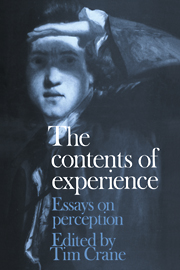Book contents
- Frontmatter
- Contents
- Preface
- Notes on contributors
- 1 Introduction
- 2 The puzzle of experience
- 3 How to interpret ‘direct perception’
- 4 Experience and its objects
- 5 Scenarios, concepts and perception
- 6 The nonconceptual content of experience
- 7 Visual qualia and visual content
- 8 The projective theory of sensory content
- 9 Sight and touch
- 10 The diversity and unity of action and perception
- References
- Index
8 - The projective theory of sensory content
Published online by Cambridge University Press: 22 September 2009
- Frontmatter
- Contents
- Preface
- Notes on contributors
- 1 Introduction
- 2 The puzzle of experience
- 3 How to interpret ‘direct perception’
- 4 Experience and its objects
- 5 Scenarios, concepts and perception
- 6 The nonconceptual content of experience
- 7 Visual qualia and visual content
- 8 The projective theory of sensory content
- 9 Sight and touch
- 10 The diversity and unity of action and perception
- References
- Index
Summary
The philosophy of perception is dominated by trichotomies: traditional discussions focused on the relative merits of direct realism, indirect realism, and phenomenalism (see e.g. Moore 1959, pp. 32–59). But these discussions confused issues in metaphysics and epistemology with those that concern perception alone. More recent discussions have moved on to a new trichotomy concerning the nature of perceptual representation: representative theories of perception, adverbial theories, and informational theories. Yet it cannot, I think, be said that this trichotomy forms a Hegelian triad; the search for a synthesis is still on. In this paper I shall present one possible solution – what I shall call the projective theory.
Since the merits of the projective theory are best appreciated in the context of a critical survey of the members of the current trichotomy, I shall briefly discuss these, starting out from the approach characteristic of informational theories. These theories are the result of the application of a broadly functionalist treatment of mental representation to perception; so the content of perceptual representations is taken to be exhaustively determined by the causal role of such representations in bringing information about the environment to bear upon the control of behaviour.
Information
- Type
- Chapter
- Information
- The Contents of ExperienceEssays on Perception, pp. 177 - 195Publisher: Cambridge University PressPrint publication year: 1992
Accessibility standard: Unknown
- 10
- Cited by
